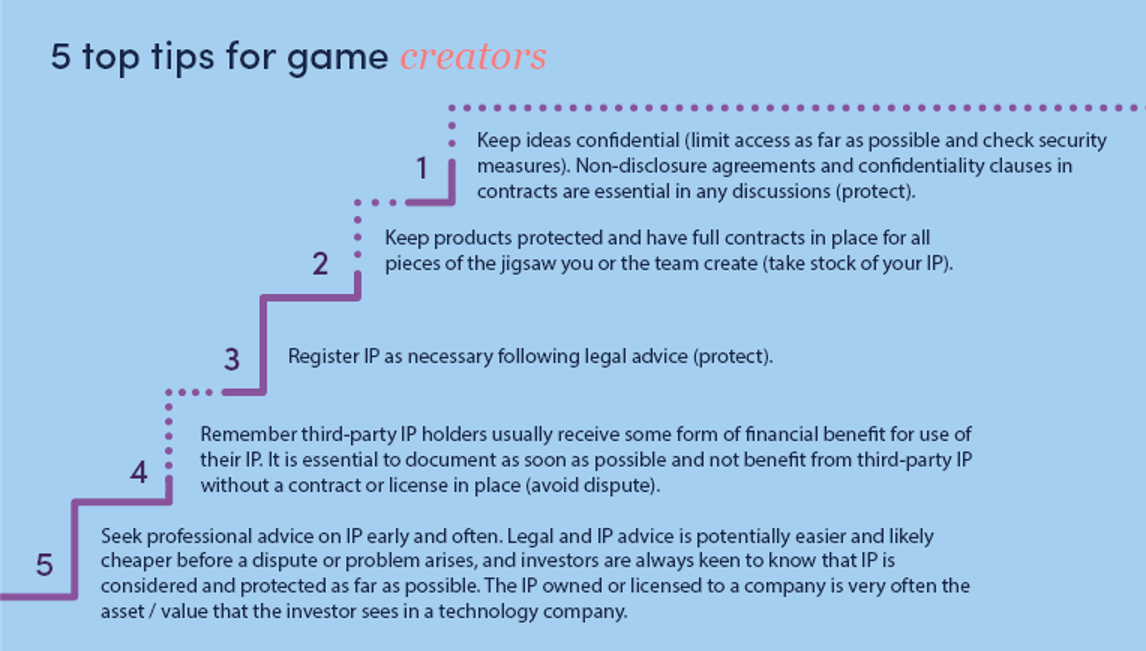
Formulating the legal framework needed for a video game (or indeed most technology companies) is best compared with trying to do a jigsaw - it’s impossible to complete without all the pieces.
Games are becoming increasingly complex, and development often involves multiple people or teams. Infringements around intellectual property (IP) are not always obvious – especially in the early days of development or commercialisation – but controlling as much as you can and keeping control of the pieces is essential. Seeking legal advice early and often is critical.
"Identifying who owns any IP – and how that is rewarded – is all about avoiding dispute."
A video game, whether for mobiles, PCs or consoles, is a collection of different pieces of IP, from first drawings to characters, sounds and scripts. Anyone seeking to create a hit for gaming screens, or to invest in one, must keep sight of the fact that different parts of the jigsaw may have different owners – each of whom could be entitled to a stake in a game creator’s success depending on legal relations.
That is why it’s vital for any gaming or technology company to understand these aspects, and why they are one of the first aspects an investor will – or should – check.
Lay out the IP jigsaw
When advising video gaming or technology start-ups and creators, as well as investors doing due diligence, I always urge a clear layout of all of the jigsaw pieces. This can be hard. The creators may not know what the final product will look like, they may be developing it in their spare time and be hard-pressed to look at IP issues, or they may not know about them. But it’s vital to secure all the pieces (creatively and legally) at the earliest opportunity.
Procrastinating on this or overlooking some of the jigsaw pieces could be problematic should you seek investment to enable you to complete the jigsaw or should the game become successful. It’s a lesson we tell everyone – from the students we mentor at Abertay University’s Dare Academy to experienced investors and business angels looking at early-stage gaming companies.
Identifying who owns any IP – and how that is rewarded – is all about avoiding dispute. That means getting legal advice and contracts in place as soon as possible. This is particularly the case when working with anyone you do not employ, whether they’re a consultant, friend or someone else in your networks.
Back to basics: what IP is and is not
Before we get too far down the line, it’s important to understand IP itself. IP is something unique that you create; an idea alone is not IP.
You have the right to use IP if you:
- created it or employed someone who created it (and if the creation meets requirements for copyright, trademark, patent or design)
- assigned or licensed IP rights from the creator or a previous owner (for instance, music rights or IP developed by a consultant or service provider)
In video games, IP protections can help stop the theft or copying of:
- things that it writes, makes or produces (along with any related works including soundtrack, voiceover, sound effects, photographs, maps, choreography, animation, the game’s engine and coding). Copyright is the main legal protection here and offers game creators significant protection
- trademarks (names of a product, character or brand)
- inventions
Notwithstanding above it’s essential to get advice on how everything fits together and to ensure IP protection is maximized.
Without each piece of the jigsaw, a game may not work – and if you do not have all the necessary rights in the IP a costly claim process may be inevitable if you were to create the next Scottish video game hit! The one thing you should avoid at all costs (and any investor will want to avoid also) is the success of a video game being overshadowed by a costly and complicated legal battle.
The technology sector is an exciting part of the Scottish economy, one which holds so much talent and potential. We at Lindsays are proud to be supporting it and playing our part in providing a springboard for technology start-ups.

Lawyer Alastair Smith is a Director in the Corporate and Commercial team at Lindsays, who works extensively with video game creators.
Lindsays is among the sponsors of Abertay University’s Dare Academy which was recently recognised with the TIGA Best Talent Initiative Award at the TIGA UK Games Education Awards 2021.
